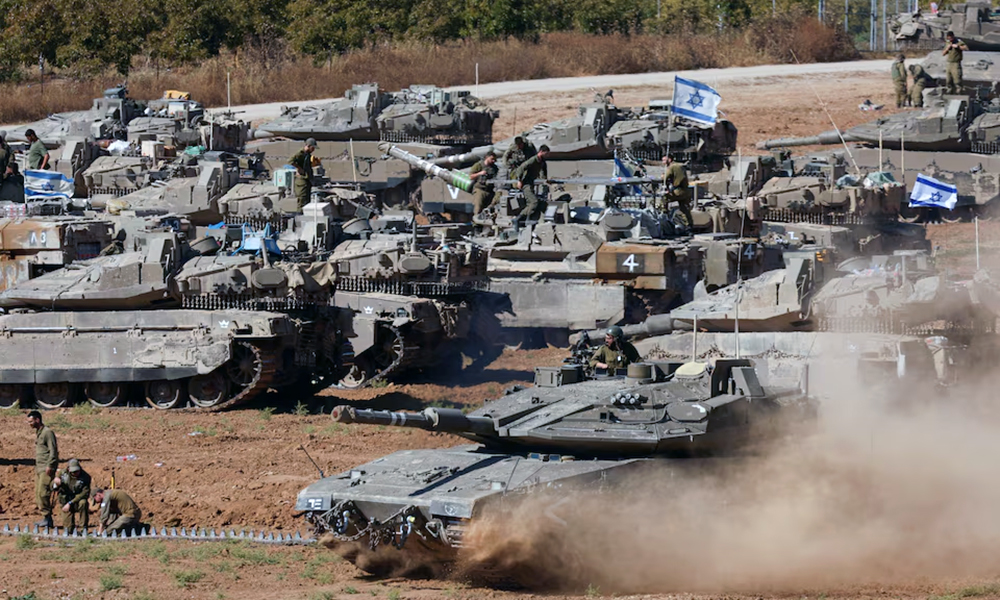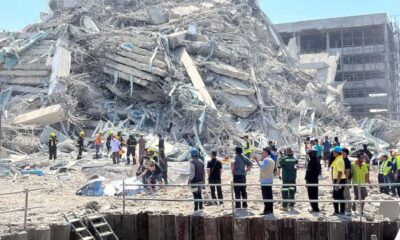World
US believes Hamas, Israel can break Gaza ceasefire impasse; Israeli forces cut Rafah aid route

The U.S. said negotiations on a Gaza ceasefire should be able to close the gaps between Israel and Hamas while Israeli forces seized the main border crossing in Rafah on Tuesday, closing a vital route for aid, Reuters reported.
Hamas official Osama Hamdan, speaking to reporters in Beirut, warned that if Israel’s military aggression continued in Rafah, there would be no truce agreement.
The Palestinian militant group accused Israel of undermining ceasefire efforts in the seven-month-long war that has laid waste to Gaza and left hundreds of thousands of its people homeless and hungry.
The truce comments came as Israel invaded Rafah, a southern Gazan city where more than one million displaced Palestinian civilians have sought shelter from Israel’s offensive throughout the tiny territory.
White House spokesperson John Kirby said Hamas offered amendments on Monday to an Israeli proposal aimed at ending the impasse. The deal text, as amended, suggests the remaining gaps can “absolutely be closed,” he said. He declined to specify what those were.
Israel on Monday said a three-phase proposal that Hamas approved was unacceptable.
Kirby said mediators from Qatar and Egypt along with U.S. and Israeli officials were gathering in Cairo. Hamas separately said its delegation was in Cairo as well.
OFFENSIVE
Israel’s seizure of the Rafah crossing came despite weeks of calls that the U.S., other nations and international bodies hoped would deter a big offensive in the Rafah area – which Israel says is Hamas fighters’ last stronghold, read the report.
Israeli army footage showed tanks rolling through the Rafah crossing complex between Gaza and Egypt, and the Israeli flag raised on the Gaza side.
Israeli Prime Minister Benjamin Netanyahu said seizing the crossing was a “very significant step” toward Israel’s stated aim of destroying Hamas’s military capabilities.
Residents reported heavy tank shelling on Tuesday evening in some areas of eastern Rafah. A Rafah municipal building caught fire after Israeli shelling, residents and Hamas media said. Medics said one Palestinian was killed and several wounded in the building while an Israeli strike also killed two Palestinians on a motorcycle.
Health officials said Abu Yousef Al-Najar, the main hospital in Rafah, closed on Tuesday after heavy bombardment nearby led medical staff and around 200 patients to flee, Reuters reported.
“They have gone crazy. Tanks are firing shells and smoke bombs cover the skies,” said Emad Joudat, 55, a Gaza City resident displaced in Rafah.
“I am now seriously thinking of heading north, maybe to the central Gaza area. If they move further into Rafah, it will be the mother of massacres,” he told Reuters via a chat app.
Many of those in Rafah were previously displaced from other parts of Gaza following Israel’s orders to evacuate from there.
Families have been crammed into tented camps and makeshift shelters, suffering from shortages of food, water, medicine and other essentials.
The U.N. and other international aid agencies said the closing of the two crossings into southern Gaza – Rafah and Israeli-controlled Kerem Shalom – had virtually cut the enclave off from outside aid and very few stores were available inside.
Red Crescent sources in Egypt said shipments had completely halted. “These crossings are a lifeline… They need to be reopened without any delay,” Philippe Lazzarini, head of U.N. aid agency UNRWA, said on X.
Separately, Jordan said Israeli settlers attacked a humanitarian convoy on its way to a crossing in northern Gaza.
The White House said it had been told the Kerem Shalom crossing would re-open on Wednesday and fuel deliveries through Rafah would resume then too.
U.N. Secretary-General Antonio Guterres appealed to Israel and Hamas to spare no effort to get a truce deal. “Make no mistake – a full-scale assault on Rafah would be a human catastrophe,” Guterres said.
‘PANIC AND DESPAIR’
Israel’s military said it was conducting a limited operation in Rafah to kill fighters and dismantle infrastructure used by Hamas, which runs Gaza. It told civilians to go to what it calls an “expanded humanitarian zone” some 20 km (12 miles) away.
In Geneva, U.N. humanitarian office spokesperson Jens Laerke said “panic and despair” were gripping the people in Rafah.
Civilians did not have enough time to prepare for evacuation and no safe route to travel, he said. The roads are “littered with unexploded ordnance, massive bombs lying in the street. It’s not safe,” he said.
Critics of the Gaza war have urged U.S. President Joe Biden to pressure Israel to change course. The U.S., Israeli’s closest ally and main weapons supplier, has delayed some arms shipments to Israel for two weeks, according to four sources on Tuesday.
The White House and Pentagon declined comment, but this would be the first such delay since the Biden administration offered its full support to Israel after Hamas’ Oct. 7 attack, read the report.
Israel’s offensive has killed 34,789 Palestinians, most of them civilians, in the conflict, the Gaza Health Ministry said.
The war began when Hamas militants attacked Israel on Oct. 7, killing about 1,200 people and abducting about 250 others, of whom 133 are believed to remain in captivity in Gaza, according to Israeli tallies.
Any truce would be the first pause in fighting since a week-long ceasefire in November during which Hamas freed around half of the hostages and Israel released 240 Palestinians it was holding in its jails.
Since then, all efforts to reach a new truce have foundered over Hamas’ refusal to free more hostages without a promise of a permanent end to the conflict, and Israel’s insistence that it would discuss only a temporary pause.
World
Israel kills Hezbollah official in deadly Beirut airstrike

An Israeli airstrike killed four people including a Hezbollah official in Beirut’s southern suburbs on Tuesday, a Lebanese security source said, further testing a shaky ceasefire between Israel and Iran-backed Hezbollah.
The Israeli military said the official – Hassan Bdeir – was a member of a Hezbollah unit and Iran’s Quds Force, and he had assisted the Palestinian group Hamas in planning a “significant and imminent terror attack against Israeli civilians,” Reuters reported.
The Lebanese security source said the target was a Hezbollah figure whose responsibilities included the Palestinian file. The Lebanese health ministry said the strike killed four people – including a woman – and wounded seven others.
It marked Israel’s second airstrike in the Hezbollah-controlled suburb of Beirut in five days, adding to strains on the U.S.-brokered ceasefire that ended last year’s devastating conflict.
The attacks on Beirut’s southern suburbs have resumed at a time of broader escalation in the region, with Israel having restarted Gaza strikes after a two-month truce and the United States hitting the Iran-aligned Houthis of Yemen in a bid to get them to stop attacking Red Sea shipping.
Hezbollah lawmaker Ibrahim Moussawi said the Israeli attack amounted to “a major and severe aggression that has escalated the situation to an entirely different level”.
Speaking in a televised statement after visiting the building that was struck, he called on the Lebanese state to “activate the highest level of diplomacy to find solutions”.
Israeli Foreign Minister Gideon Saar said the eliminated Hezbollah operative posed “a real and immediate threat”. “We expect Lebanon to take action to uproot terrorist organizations acting within its borders against Israel,” he said.
Israel dealt severe blows to Hezbollah in the war, killing thousands of its fighters, destroying much of it arsenal and eliminating its top leadership including Hassan Nasrallah.
Hezbollah has denied any role in recent rocket attacks from Lebanon towards Israel, including one that prompted Israel to carry out an airstrike on the southern suburbs last Friday.
Tuesday’s strike in the early hours appeared to have damaged the upper three floors of a building, a Reuters reporter at the scene said, with the balconies of those floors blown out.
The glass on the floors below was intact, indicating a targeted strike. Ambulances were at the scene as families fled to other parts of Beirut.
There was no advance warning, in contrast to the attack on Friday when the Israeli military announced which building it intended to hit and ordered residents to leave the area.
Lebanese President Joseph Aoun condemned the latest airstrike, calling it a “dangerous warning” that signals premeditated intentions against Lebanon, which would intensify diplomatic outreach and mobilise international allies.
Lebanese Prime Minister Nawaf Salam said the strike was a flagrant breach of a U.N. Security Council Resolution upon which the ceasefire was based, and the ceasefire arrangement.
U.S. BACKS ISRAEL
The ceasefire agreement demanded that southern Lebanon be free of Hezbollah fighters and weapons, that Lebanese troops deploy into the area, and that Israeli troops withdraw.
But each side accuses the other of failing to implement the terms fully. Israel says Hezbollah still has infrastructure in the south, while Lebanon and Hezbollah say Israel is occupying Lebanese soil by not withdrawing from five hilltop positions.
The U.S. State Department said that Israel was defending itself from rocket attacks that came from Lebanon and that Washington blamed “terrorists” for the resumption of hostilities.
“Hostilities have resumed because terrorists launched rockets into Israel from Lebanon,” a State Department spokesperson said in an email, responding to a question from Reuters seeking reaction to Tuesday’s airstrike. Washington supported Israel’s response, the spokesperson said.
The Israel-Hezbollah conflict was ignited when Hezbollah opened fire in support of Hamas at the start of the Gaza war. It escalated in September when Israel went on the offensive, declaring the aim of securing the return home of tens of thousands of people evacuated from homes in the north.
The war uprooted more than a million people and killed at least 3,768 people in Lebanon, according to a Lebanese health ministry toll from November. Dozens more have been reported killed by Israeli fire since the ceasefire.
Lebanon’s figures do not distinguish between civilians and fighters.
During the war, Hezbollah strikes killed 45 civilians in northern Israel and the Israeli-occupied Golan Heights. At least 73 Israeli soldiers were killed in northern Israel, the Golan Heights, and in combat in southern Lebanon, according to Israeli authorities.
World
Trump says Zelenskiy wants to back out of critical minerals deal

U.S. President Donald Trump said on Sunday Ukrainian President Volodymyr Zelenskiy wants to back out of a critical minerals deal, warning the Ukrainian leader would face big problems if he did.
“He’s trying to back out of the rare earth deal and if he does that he’s got some problems, big, big problems,” Trump told reporters.
“He wants to be a member of NATO, but he’s never going to be a member of NATO. He understands that.”
(Reuters)
World
South Korea, China, Japan seek regional trade amid Trump tariffs

South Korea, China and Japan held their first economic dialogue in five years on Sunday, seeking to facilitate regional trade as the three Asian export powers brace from U.S. President Donald Trump’s tariffs.
The countries’ three trade ministers agreed to “closely cooperate for a comprehensive and high-level” talks on a South Korea-Japan-China free trade agreement deal to promote “regional and global trade”, according to a statement released after the meeting.
“It is necessary to strengthen the implementation of RCEP, in which all three countries have participated, and to create a framework for expanding trade cooperation among the three countries through Korea-China-Japan FTA negotiations,” said South Korean Trade Minister Ahn Duk-geun, referring to the Regional Comprehensive Economic Partnership.
The ministers met ahead of Trump’s announcement on Wednesday of more tariffs in what he calls “liberation day”, as he upends Washington’s trading partnerships.
Seoul, Beijing and Tokyo are major U.S. major trading partners, although they have been at loggerheads among themselves over issues including territorial disputes and Japan’s release of wastewater from the wrecked Fukushima nuclear power plant.
They have not made substantial progress on a trilateral free-trade deal since starting talks in 2012.
RCEP, which went into force in 2022, is a trade framework among 15 Asia-Pacific countries aimed at lowering trade barriers.
Trump announced 25% import tariffs on cars and auto parts last week, a move that may hurt companies, especially Asian automakers, which are among the largest vehicle exporters to the U.S.
After Mexico, South Korea is the world’s largest exporter of vehicles to the United States, followed by Japan, according to data from S&P.
The ministers agreed to hold their next ministerial meeting in Japan.
(Reuters)
-

 Business4 days ago
Business4 days ago36 mining contracts inked over the past year: Mines ministry
-

 Latest News4 days ago
Latest News4 days agoDried fruit market in Herat booms ahead of Eid-al-Fitr
-

 Regional4 days ago
Regional4 days agoPowerful quake in Southeast Asia kills several, Myanmar declares state of emergency
-

 Latest News4 days ago
Latest News4 days agoUS may ask for military equipment left behind in Afghanistan: Trump
-

 International Sports5 days ago
International Sports5 days agoLucknow’s six-hitting machine Pooran justifies top order slot
-

 Latest News3 days ago
Latest News3 days agoMore than 70,000 Afghans returned home in third week of March: IOM
-

 Latest News4 days ago
Latest News4 days agoNegotiations with Afghanistan are the only way forward: Pakistan’s ex-PM Khan
-

 Health3 days ago
Health3 days agoGlobal organizations warn of health crisis due to aid cuts in Afghanistan
























